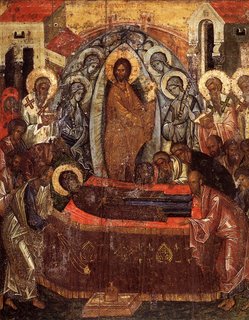
St. Ignatius wrote to the Church of Jerusalem: "...I intend to come to you in order to see the faithful gathered in Jerusalem, and especially the Mother of Jesus: they say of her that she is honorable, affable, and arouses wonder in all, and all wish to see her. But who would not wish to see the Virgin and to converse with her who bore the true God? ...With us she is glorified as the Mother of God and the Virgin full of grace and virtue. They say of her that she is joyful in troubles and persecutions, does not grieve in poverty and want, and not only does not get angry with those who offend her but does good to them still more... All who see her are delighted."
To reiterate, 'all who see her are delighted;' and why? Because 'she is glorified'. She is glorified 'as the Mother of God and the Virgin full of grace.' Since it is logical that we should glorify what God honours, Mary has been glorified as being holy -- that is, separated for God -- from the infancy of the Church. Also this sense of her holiness helps us to understand why Joseph left Mary as a virgin. What manner of man would touch that which God has separated for Himself? One who wishes to face His wrath. To the ancient Hebrew mind, the answer was self-evident, especially given certain precedents. Though most see in this a sense of Mary's purity, I see in this situation a manifestation of Joseph's manly personality. As manliness is mostly made manifest through self-control, we can see in Joseph a supremely manly example of a man abstaining out of a desire to honour 'what had been separated' or 'made holy by God's Presence'. One would be not far from the truth to see in Joseph a certain type of monastic. Without a doubt Joseph's role as a protector of Mary and Jesus is the one we generally think of. In my heart I believe that Our Lord was joyful to meet with His human father when He ascended, so 'well pleased' was He with him and his manliness.
In a complete change of topic, I will discuss my favourite Bob Dylan albums. I will limit my list to only five albums. Any serious Dylan fan will likely be able to accurately guess 3 of the 5 on my list; for in the period 1964-1966 Dylan produced three works which could be viewed as being among the greatest artistic achievements of the 20th Century. Highway 61 Revisited, Bringing It All Back Home and Blonde On Blonde are 'must listen to albums' if you are interested in Bob Dylan. There are single hits on these albums, but I think they play best as cohesive units and should be best enjoyed as albums. Bob married in late 1965 and had a child in 1966; this combined with a motorcycle crash caused Dylan to slow his creative production a bit. The John Wesley Harding album from 1967 is a fine album, but even with "All Around the Watchtower" on it, the album does not make my top five Dylan albums. But his Nashville Skyline album from 1969 does; with his duet on "North Country Girl" with Johnny Cash, onto "Country Pie" and "Lay Lady Lay" the album is a truly magnificent unit. The depth and power of Dylan's lyrics on Nashville Skyline lies in their simplicity, as most of the songs narrate ordinary life experiences. Boring, perhaps to some, but timeless to those who know life's joys and woes. After Bob Dylan's accident, his lyrics became more and more concerned with religious themes. This is the case with his work through the 70s and 80s. Of this body of work, two albums stand out. Oh Mercy from 1989 and Infidels from 1983 are both fine albums. But for my fifth album I will go with Oh Mercy. The chiming, apocalyptic-sounding guitar work on the dobro by Daniel Lanois is evident throughout the album, but nowhere as effectively as on the track "Man in the Long Black Coat". Dylan and Lanois create a windy, end-of-time atsmosphere with a melody that haunts a listener well after the track has played.
So my top 5 Bob Dylan Albums would be these, with due honour to Bob's first album "Bob Dylan" being noted:
1. Highway 61 Revisisted
2. Bringing It All Back Home
3. Blonde on Blonde
4. Nashville Skyline
5. Oh Mercy

2 comments:
I love non sequiturs. :)
what do you mean? bob follows 'almost' as a corollary from the subject of the theotokos:)
Post a Comment